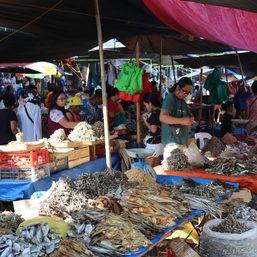SUMMARY
This is AI generated summarization, which may have errors. For context, always refer to the full article.

GENERAL SANTOS CITY (UPDATED) – Mayor Ronnel Rivera has refuted claims of environmental organizations Greenpeace and the World Wildlife Fund (WWF) that this city is no longer the tuna capital of the Philippines.
Rivera said the conventional rule is catches landed in the country are regarded as Philippine catches regardless of origin.
More than 90% of the country’s annual tuna catches are taken to General Santos.
On Thursday, September 4, Rivera will open the 16th National Tuna Congress, where some 600 delegates are expected to attend the annual event permanently hosted by General Santos.
Greenpeace and the WWF, along with other environment groups, claimed catches landed in General Santos are not caught in the city but well outside of the country’s territorial waters.
Greenpeace has been calling for strong government regulation of purse seine fishing on fads due to depleting big eye tuna stocks in the Western and Central Pacific Ocean. (READ: Pacific fisheries chief warns tuna stocks dangerously low)
Mindoro new tuna capital?
The WWF earlier said that Mindoro is now emerging as the tuna capital of the Philippines.
Joselito Tiongson, WWF site manager for Mindoro, early this year said some 600 tons (600,000 kilos) of yellowfin tuna were delivered around the Philippines in 2011 and 2012.
This was quickly downplayed by Rivera, who said, “What they (in Mindoro) caught in one month, we get in 3 hours of operations.”
Over the last 5 years, General Santos produced an average of 750 tons of yellowfin tuna every month.
The Philippine Fishport Development Authority (PFDA) in General Santos reported a total fish catch of 167,578.75 tons (167,578,750 kilos) in 2013 alone. More than 80% of fish landings in the city were tuna and tuna-like species.
The 2013 volume of fish landings was the highest in 5 years.
In the first half of 2014, PFDA reported a total of 104,310.96 tons of fish landings at the fishport complex.
The Bureau of Fisheries and Aquatic Resources has been calling for a 165,000 metric ton ceiling for tuna catches in the country.
Better prizes
Tuna trader Eliseo “Rock” Garay nevertheless confirmed that some of the big yellowfin tuna catches from Mindoro have ended up at General Santos’ fishport complex.
“Fishermen and traders from Mindoro bring their catch to the city because they can get better prices for their tuna here,” Garay said in an earlier interview.
Former Peace Corp volunteer and American John Heitz, another long-time fresh chilled tuna exporter here, said it is not only Mindoro that is bringing their catch in General Santos.
“Fishermen and traders from Davao and Palawan sometimes also bring their catch here,” he said.
General Santos regularly flies boxed chilled yellowfin tuna to the US and Japan.
Fresh tuna exporters here used to have an allocation of 10 tons of cargo space in Philippine Airlines flight from this city.
Cebu Pacific has also begun accommodating tuna cargoes from the city.
Prices of sashimi-class yellow fin tuna were between P270 to P300 per kilo at the fishport in yesterday’s trading, September 3.
Frozen tuna
Over the last 5 years, more than half of tuna landings in the city were frozen tuna.
From 2009 to 2013, a total of 397,908.77 tons of frozen tuna arrived at the PFDA complex in Tambler.
Of the total frozen tuna landed in the city over the said period, 324,284.93 tons came from foreign origin.
All frozen tuna ended up in the city’s 6 tuna canning plants.
Mayor Rivera has repeatedly conceded that the city’s fishermen no longer enjoyed the same volume of catch they did more than a decade ago.
Rivera’s family is owner of the city’s biggest tuna fishing company, RD Fishing. But RD Fishing has concentrated their operations in Papua New Guinea and Indonesia.
They also own Philbest Canning, one of the country’s 7 tuna canning plants, and part owner of Celebes Canning.
The RD Group will open a canning plant in Indonesia in October. – Rappler.com
Add a comment
How does this make you feel?
![[ANALYSIS] A new advocacy in race to financial literacy](https://www.rappler.com/tachyon/2024/04/advocacy-race-financial-literacy-April-19-2024.jpg?resize=257%2C257&crop_strategy=attention)


![[In This Economy] Can the PH become an upper-middle income country within this lifetime?](https://www.rappler.com/tachyon/2024/04/tl-ph-upper-income-country-04052024.jpg?resize=257%2C257&crop=295px%2C0px%2C720px%2C720px)

There are no comments yet. Add your comment to start the conversation.